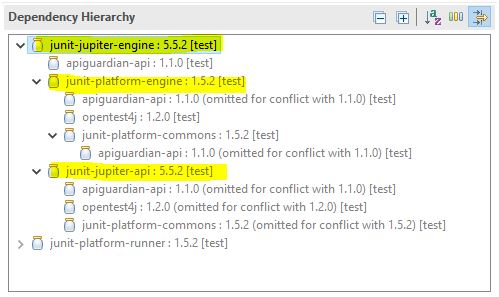Learn to configure JUnit 5 with Maven, different JUnit modules and how to use these modules to create and execute tests.
Please note that JUnit 5 requires minimum Java 8 at runtime.
1. JUnit 5 Maven Dependency
To run JUnit 5 tests through Maven, below are the main required dependencies:
junit-jupiter-api: It is the main module where all core annotations are located, such as @Test, Lifecycle method annotations and assertions.junit-jupiter-engine: It has test engine implementation which is required at runtime to execute the tests.junit-platform-suite: The@Suitesupport provided by this module to make theJUnitPlatformrunner obsolete.junit-jupiter-params: Support for parameterized tests in JUnit 5.
An example pom.xml file is given below.
<project xmlns="http://maven.apache.org/POM/4.0.0"
xmlns:xsi="http://www.w3.org/2001/XMLSchema-instance"
xsi:schemaLocation="http://maven.apache.org/POM/4.0.0
https://maven.apache.org/xsd/maven-4.0.0.xsd">
<modelVersion>4.0.0</modelVersion>
<groupId>com.howtodoinjava</groupId>
<artifactId>JUnit5Examples</artifactId>
<version>0.0.1-SNAPSHOT</version>
<packaging>jar</packaging>
<properties>
<project.build.sourceEncoding>UTF-8</project.build.sourceEncoding>
<maven.compiler.source>17</maven.compiler.source>
<maven.compiler.target>${maven.compiler.source}</maven.compiler.target>
<junit.jupiter.version>5.9.1</junit.jupiter.version>
<junit.platform.version>1.9.1</junit.platform.version>
</properties>
<dependencies>
<dependency>
<groupId>org.junit.jupiter</groupId>
<artifactId>junit-jupiter-engine</artifactId>
<version>${junit.jupiter.version}</version>
<scope>test</scope>
</dependency>
<dependency>
<groupId>org.junit.jupiter</groupId>
<artifactId>junit-jupiter-api</artifactId>
<version>${junit.jupiter.version}</version>
<scope>test</scope>
</dependency>
<dependency>
<groupId>org.junit.jupiter</groupId>
<artifactId>junit-jupiter-params</artifactId>
<version>${junit.jupiter.version}</version>
<scope>test</scope>
</dependency>
<dependency>
<groupId>org.junit.platform</groupId>
<artifactId>junit-platform-suite</artifactId>
<version>${junit.platform.version}</version>
<scope>test</scope>
</dependency>
</dependencies>
<build>
<plugins>
<plugin>
<artifactId>maven-compiler-plugin</artifactId>
<version>3.8.1</version>
</plugin>
<plugin>
<groupId>org.apache.maven.plugins</groupId>
<artifactId>maven-surefire-plugin</artifactId>
<version>2.22.2</version>
<configuration>
<argLine>
--illegal-access=permit
</argLine>
</configuration>
</plugin>
<plugin>
<groupId>org.apache.maven.plugins</groupId>
<artifactId>maven-failsafe-plugin</artifactId>
<version>2.22.2</version>
<configuration>
<argLine>
--illegal-access=permit
</argLine>
</configuration>
</plugin>
</plugins>
</build>
</project> 2. Executing JUnit 4 Tests with JUnit 5
To execute JUnit 4 tests in the JUnit 5 environment, you will need JUnit Platform Surefire Provider plugin.
It can run JUnit 4-based tests as long as you configure a junit dependency and add the JUnit Vintage test engine implementation to the dependencies of the maven-surefire-plugin similar to the following.
<build>
<plugins>
<plugin>
<artifactId>maven-surefire-plugin</artifactId>
<version>2.19</version>
<dependencies>
<dependency>
<groupId>org.junit.platform</groupId>
<artifactId>junit-platform-surefire-provider</artifactId>
<version>1.0.0-M4</version>
</dependency>
<dependency>
<groupId>org.junit.vintage</groupId>
<artifactId>junit-vintage-engine</artifactId>
<version>4.12.0-M4</version>
</dependency>
</dependencies>
</plugin>
</plugins>
</build>
<dependencies>
<dependency>
<groupId>junit</groupId>
<artifactId>junit</artifactId>
<version>4.12</version>
<scope>test</scope>
</dependency>
</dependencies>By configuring the above in pom.xml, you can now run your old tests with JUnit 5.
Happy Learning !!


Comments